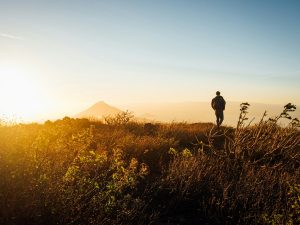An excerpt from The Art of Asking Better Questions
We live in a world that has conditioned us toward answers. We’ve been taught to give the right answers, yet little attention has been given to teaching us how to ask the right questions. We don’t have a shortage of information; we have a shortage of wisdom, curiosity and wonder. Asking good questions is a lost art.
What if our obsession with the right answers is blinding us to the power of better questions? What if we learned to ask the right questions at the right time for the right reason?
When he was a boy, Albert Einstein asked himself, “What would you see if you were traveling on a beam of light?” This question led to the theory of relativity.
In his presidential inaugural address in 1961 on the steps of the U.S. Capitol, President John F. Kennedy stated, “Ask not what your country can do for you, but what you can do for your country.” This shift in questions cast a vision for what a unified and others-oriented nation could look like.
In the 1980 presidential election, Jimmy Carter’s campaign slogan was, “A tested and trustworthy team.” Ronald Reagan’s was, “Are you better off than you were four years ago?” Reagan won by a landslide.
The 16th-century Spanish saint Teresa of Avila wrote, “When one reaches the highest degree of human maturity, one has only one question left: How can I be helpful?” Her writings continue to be read and revered.
Dr. Martin Luther King Jr. stated, “Life’s most persistent and urgent question is, ‘What are you doing for others?’” His vision continues to help us wrestle with the issue of race in America.
Have you ever noticed that America’s national anthem, “The Star-Spangled Banner,” penned by Francis Scott Key in 1814, is nothing more than two long questions?
Have you ever paid much attention to the questions you ask? And have you considered why you ask questions at all?
The questions we ask often reveal the values we hold.
The questions we ask determine the life we live.
Consider the most significant questions you’ve asked or been asked in your life.
Who am I?
What will I do with my life?
What’s most important to me?
What is true, good, and beautiful?
Will you follow me?
Will you accept the job?
Will you trust me?
Will you marry me?
I’m passionate about questions because I have seen the impact they can have in people’s lives—and in my own. The more I study, utilize and train people around questions, the more convinced I become: questions are a powerful force in the world, far more potent than we’ve given them credit for. And yet, I’ve not arrived; I never will. I’m still learning how to ask questions of substance and significance. None of us fully arrives, but we can all improve in the questions we ask.
I have a bone-deep conviction that all of us need to ask more questions—and better questions. Doing so can change your life and the lives of those around you. I’m not the only one who is convinced that questions are powerful. Dozens of research studies have revealed their numerous benefits. People who ask frequent questions are more popular among their peers and more often seen as leaders. They have more social influence and are sought out more frequently for friendship and advice. Asking better questions helps you to navigate crucial conversations effectively and handle conflict productively. And they lead to more effective reading comprehension.
They also have massive neurological effects. Questions stimulate your brain, releasing serotonin and a rush of dopamine. They trigger a reflex called instinctive elaboration, which takes over your thought process, rendering you incapable of thinking of anything else. Questions are so powerful researchers have described them as having the ability to hijack our brains. Let me give you an example: What color are the shoes you’re wearing? (See what just happened—you couldn’t help it, could you?) Our thoughts are shaped by the questions we’re asked. While most of us believe we’re good at multitasking, numerous studies reveal that humans are terrible at it. Which means that when you ask someone a question, you have hijacked their thoughts, even if for just a brief moment. A good question is an invitation for participation and engagement—with others and inside your own body.
Good questions are gifts we extend to others.
They are like keys on a key ring, capable of unlocking doors and opening new passageways.
They are windows by which we see others and mirrors by which we see ourselves.
They are archaeologists’ tools—trowels, shovels and spades—excavating hidden treasures lying beneath the surface.
Good questions are flashlights shining a light on where we need to go next.
They are screwdrivers that pop open a stuck lid on a can of paint.
They are like neck muscles that move the head to focus on certain things and turn away from others.
And some questions are like gadflies and midwives. They are tools used to leverage good in the world, but we don’t use the same tool in every situation. Therefore, we need wisdom to discern which tool to use when.
Asking great questions has the power and potential to improve the quality of every single area of life—your relationships, your career, your faith and your future. It can have a significant impact on neighborhoods, schools, churches, workplaces and online. In fact, there’s not a single area where improving the quality of the questions you ask won’t improve the quality of your life and the lives of those around you. Few things can bring about change more effectively than the right question.
Once you see how rich and textured and colorful the world can be with better questions, you won’t want to turn back.
Taken from The Art of Asking Better Questions by J.R. Briggs. Copyright (c) 2025 by J.R. Briggs. Used by permission of InterVarsity Press. www.ivpress.com
Do Good:
- Read The Art of Asking Better Questions by J.R. Briggs.
- It’s because of people like you that The Salvation Army can serve more than 27 million Americans in need each year. Your gift helps fight for good all year in your community. It’s an effort to build well-being for all of us, so together we rise—and that good starts with you. Give to spread hope with a donation of funds, goods or time today.












